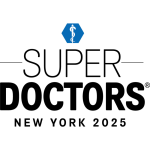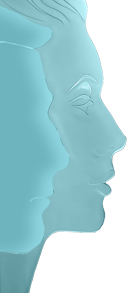

After years of sun, squinting, laughing, frowning, smoking, and worrying, the skin around the eyes and on the forehead will often develop deep lines and wrinkles called “expression lines.” A frequent concern is that they often make you look older, tired, or stressed. Until recently, these advanced furrows have been difficult to treat. Now, by utilizing this FDA approved temporary muscle-relaxing agent, you can reduce "permanent expression lines". Botox®, Xeomin®, Jeuveau®, & Evolysse™, Dysport® are extremely popular “neuromodulators,” used to treat fine lines and wrinkles. It is one of our favorite procedures to perform because of the extremely high patient satisfaction rate, and a great place to start if you are considering a cosmetic procedure for the first time.
If you want to prevent the earliest fine lines from becoming full-blown wrinkles, preventative use of neuromodulator's can be the solution. Approved for patients who are 18 years and older and most experts agree that patients in their mid to late 20s and early 30s are at a good age for preventative treatment.
With a very fine needle, neuromodulators are painlessly injected into the specific muscle causing fine lines and wrinkles on the face. No anesthetic is required. Treatment is effective, safe, and takes approximately 10 minutes. Immediately following treatment you may resume regular activities.
The effects usually last 3 to 4 months, and fade away gradually. Following several treatments, the results may last 4 to 8 months or longer. Neuromodulator's offer extended relief over the course of long-term treatment.
Side effects of neuromodulator's, if any, are usually mild and temporary. Botulinum toxins contain proteins, which in some circumstances may be naturally safeguarded against by the body's ability to produce antibodies. If antibodies are formed, the therapy will generate a lesser response. Temporary bruising, mild pain and swelling are sometimes experienced, though these symptoms resolve on their own within 3 to 5 days. In rare cases, there can be a slight drooping of an eyelid or asymmetry of expression. If this should happen please notify our office.
The do’s:
The don’ts :
Typically, the effect of a neuromodulator is visible within 5 -7 days. Maximum benefits are reached between 10 to 14 days. Once the muscle becomes dormant and the skin softens, you will have a more relaxed and youthful appearance. Neuromodulator treatments are not a substitute for the results achieved with a facelift. The optimum appearance may be achieved with neuromodulator therapy in conjunction with a facelift, dermal fillers, laser resurfacing, and skin rejuvenation.
Wired? Jeuveau® by Evolus, a modern, FDA-approved injectable neurotoxin treatment specifically designed to temporarily treat those pesky 11 lines between your brows.
Unlike other injectable neuromodulators, Jeuveau (prabotulinumtoxinA-xvfs) is made with proprietary Hi-Pure™ Technology. Jeuveau's manufacturing process works to purify the product, which helps achieve precise, natural-looking results you’ll love.
BOTOX® is a therapeutic muscle-relaxing agent derived from the bacterium, Clostridium Botulinum. For over a decade ophthalmologists have applied BOTOX® for it's original intention, the treatment of blepharospasm. Physicians have utilized BOTOX® for years as a cosmetic treatment to correct visible signs of stress and aging.
The contractions and movements of the facial muscles are controlled by signals from the brain. BOTOX simple prevents the muscle from allowing responses to these messages. As a result, the muscle relaxes and the overlying skin remains unwrinkled and smooth.
Botox injections have been FDA approved to treat excessive sweating. In the skin, Botox selectively turns off the sweat glands resulting in a normal appearance without wetness. Treatment is performed during an outpatient visit and no recuperative time or special care is needed afterward.


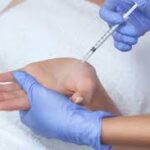
Schedule an office visit to discuss your concerns and skincare goals with Dr. Robinson and the office visit cost will be applied to the future cost for the "consulted procedure". The "consulted procedure" must be completed within 30 days of your consult visit.
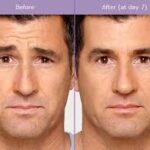


Urticaria, also known as hives, are localized, pale, itchy, pink wheals (swellings) that can burn or sting. They may occur singularly or in groups on any part of the skin. They are part of an allergic reaction and are very common. Approximately 10-20 percent of the population will have at least one episode in their lifetime. Most episodes of hives disappear quickly in a few days to a few weeks. Occasionally, a person will have them for many months or years. New hives may develop as old ones fade. Hives can vary in size from as small as a pencil eraser to as large as a dinner plate, and may join to form even larger swellings.
Hives are produced by blood plasma leaking through tiny gaps between the cell lining small blood vessels in the skin. Histamine is a chemical released from cells in the skin called mast cells; which lie along blood vessels. Allergic reactions, chemicals in foods, or medications may cause hives; sometimes it is impossible to find out the cause. When hives form around the eyes, lips, or genitals, the tissue may swell excessively. Although frightening, the swelling usually goes away in less than 24 hours. Severe cases of hives may cause difficulty in breathing or swallowing and emergency room care is required.
Acute urticaria lasts less than six weeks. An underlying cause can be frequently identified and eliminated. The most common causes for acute urticaria are foods, drugs, or infections. Insect bites, internal diseases, pressure, cold, or sunlight also may be responsible.
The most common foods that cause urticaria are: nuts, chocolate, shellfish, tomatoes, eggs, berries, and milk. Fresh foods cause hives more often than cooked foods. Food additives and preservatives may also cause hives.
Hives may appear within minutes to several hours after eating, depending upon the site within the digestive tract where the food is absorbed.
Almost any medication -- prescription or over-the-counter -- can cause hives. Antibiotics, pain medications, sedatives, tranquilizers, diuretics (water pills), diet supplements, antacids, arthritis medication, vitamins, herbal supplements, eye and eardrops, laxatives, vaginal douches, or any other non-prescription item can be a potential cause of urticaria. It is important to inform the dermatologist of ALL prescription and over-the-counter medications being used to help find the cause of the hives.
Many infections can cause urticaria. Viral upper-respiratory tract infections (colds) are a comon cause in children. Other viruses, including hepatitis and a number of bacterial and fungal infections, may cause urticaria.
Chronic urticaria lasts more than six weeks. The cause of chronic urticaria is more difficult to identify and is found only in a small percentage of patients. The dermatologist reviews a patient's medical history, asks extensive questions, and conducts a thorough physical examination. Testing, such as blood work or a biopsy, may be necessary.
Physical urticaria may be caused by sunlight, heat, cold, water, pressure, vibration, or exercise. Solar urticaria forms within minutes of sun exposure and typically fades within one to two hours. Cold urticaria appears when the skin is warmed after exposure to cold. Urticaria, which forms in response to the cold or the water when swimming, for example, can produce wheezing, flushing, generalized hives, and fainting.
Dermatographic urticaria forms after firmly stroking or scratching the skin, and can often occur with other forms of urticaria. It affects about five percent of the population. Most people with this condition are otherwise healthy. Dermatographism may last for months or even years.
The best treatment for urticaria is to find and eliminate the cause whenever possible. Antihistamines are prescribed to provide relief and work best if taken on a regular schedule to prevent hives from forming. There are many antihistamines available. No one antihistamine works for everyone. The dermatologist may use combinations to control the urticaria. In severe cases, an injection of epinephrine (adrenalin) may be needed. Cortisone may also bring dramatic relief, but its use must be limited to short periods of time.
Subcission is a treatment used to correct a type of scar called a valley scar. A valley scar simply means there is a defect in the volume of the skin at the site of the scar. The goal of subcission is to improve this decreased volume. This then allows a depressed scar to regain its smooth appearance. This treatment may be combined with other scar treatments to yield the best cosmetic results.
Rosacea is a common skin disease that causes redness, papules, and swelling on the face. Often referred to as adult acne, rosacea frequently begins as a tendency to flush or blush easily. It may progress to persistent redness in the center of the face that may gradually involve the cheeks, forehead, chin, and nose. The eyes, ears, chest, and back may also be involved. With time, small blood vessels and tiny pimples begin to appear on and around the reddened area; however, unlike acne, there are no blackheads.
When rosacea first develops, the redness may come and go. Some people may flush or blush and never form pustules or papules. Small dilated vessels may also be present. However, when the skin doesn't return to its normal color, and when other symptoms such as pimples and enlarged blood vessels become visible, it's best to seek advice from a board-certified dermatologist. The condition may last for years, rarely reverse itself, and can become worse without treatment.
Small red bumps, some of which may contain pus, appear on the face. These may be accompanied by persistent redness and the development of many tiny blood vessels on the surface of the skin.
In more advanced cases, a condition called rhinophyma may develop. The oil glands enlarge causing a bulbous, red nose, and puffy cheeks. Thick bumps may develop on the lower half of the nose and nearby cheeks. Rhinophyma occurs more commonly in men.
Anyone can get Rosacea. It is more common in fair skinned adults between the ages of 30 and 50. Since it may be associated with menopause, women are affected more often than men and may likely have an extreme sensitivity to cosmetics. In people of color, studies show that early symptoms can often be missed and may be under diagnosed because dark skin can mask facial redness. Few children get rosacea, but it is worth considering if the signs and symptoms are there.
Tips for Rosacea Patients
Many people with Rosacea are unfamiliar with it and do not recognize it in its early stages. Identifying the disease is the first step to controlling it. Self-diagnosis and treatment are not recommended since some over-the-counter skin products may make the problem worse.
Dermatologists often recommend a combination of treatments tailored to the individual patient. These treatments can stop the progress of rosacea and sometimes reverse it.
The key to successful management of Rosacea is early diagnosis and treatment. Rosacea can be treated and controlled if medical advice is sought in the early stages. When left untreated, Rosacea will get worse and may be more difficult to treat.
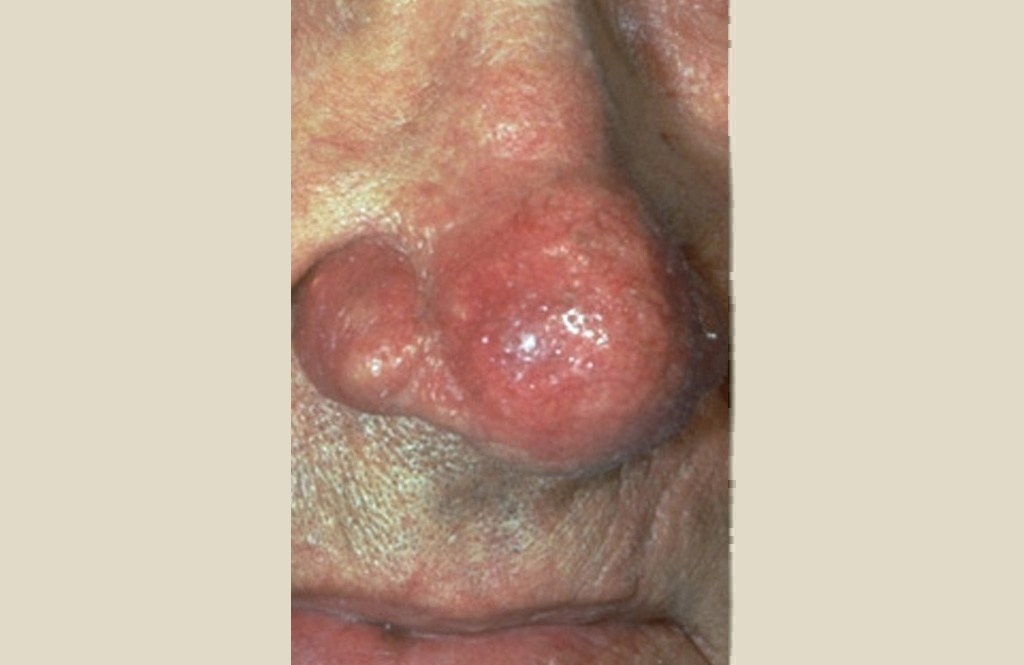
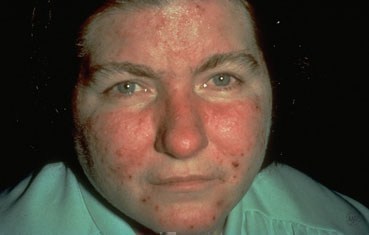
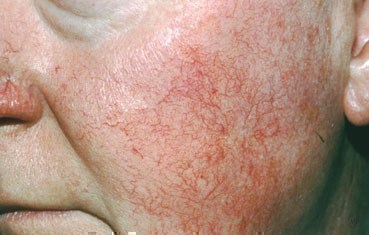
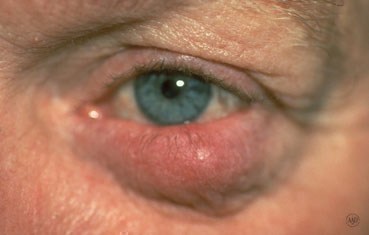


Melanoma is the most common type of cancer for young adults 25 to 29 years old, and the second most common type for adolescents and young adults 15-29 years old. Melanoma is a cancer of the pigment producing cells in the skin, known as melanocytes. Cancer is a condition in which one type of cell grows without limit in a disorganized fashion, disrupting and replacing normal tissues and their functions, much like weeds overgrowing a garden. Normal melanocytes reside in the outer layer of the skin and produce a brown pigment called melanin, which is responsible for skin color. Melanoma occurs when melanocytes become cancerous, and then grow and invade other tissues.
Melanoma begins on the surface of the skin where it is easy to see and treat. If given time to grow, melanoma can grow down into the skin, ultimately reaching the blood and lymphatic vessels, and spread around the body (metastasize), causing life-threatening illness. It is curable when detected early, but can be fatal if allowed to progress and spread. The goal is to detect melanoma early when it is still on the surface of the skin.
It is not certain how all cases of melanoma develop. Understanding what causes melanoma and whether you’re at high risk of developing the disease can help you prevent it or detect it early when it is easiest to treat and cure.
However, it is clear that excessive sun exposure, especially severe blistering sunburns early in life, can promote melanoma development. There is evidence that ultraviolet radiation used in indoor tanning equipment may cause melanoma. The risk for developing melanoma may also be inherited.
Anyone can get melanoma, but fair-skinned sun-sensitive people are at a higher risk. Since utraviolet radiation from the sun is a major culprit, people who tan poorly, or burn easily are at the greatest risk.
In addition to excessive sun exposure throughout life, people with many moles are at an increased risk to develop melanoma. The average person has around 30 moles, and most are without significance; however, people with more than 50 moles are at a greater risk. In addition to the number of moles, some people have moles that are unusual and irregular looking. These moles (nevi) are known as dysplastic or atypical moles. People with atypical moles are at increased risk of developing melanoma. Melanoma also runs in families. If a relative such as a parent, aunt or uncle had melanoma, other blood relatives are at an increased risk for melanoma.
The following factors help to identify those at risk for melanoma:
Anyone can develop melanoma, but people with one or more of the risk factors are more likely to do so. Annual skin examinations by a board-certified dermatologist can truly be life saving.
To help you find melanoma and other skin cancers early, dermatologists encourage everyone to learn the following:
The ABCDEs of melanoma
Learn to recognize a possible melanoma by learning these 5 warning signs.
How to perform a skin self-exam
Watch this short video to learn how to check your own skin for signs of melanoma and other skin cancers.
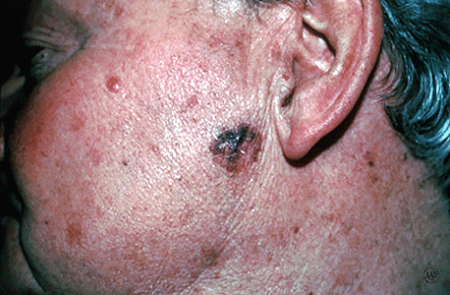
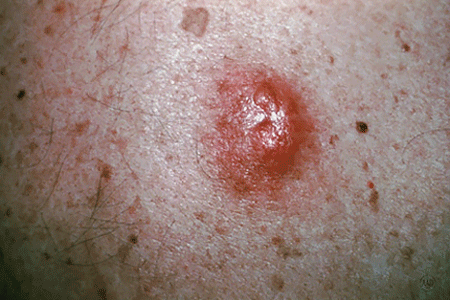
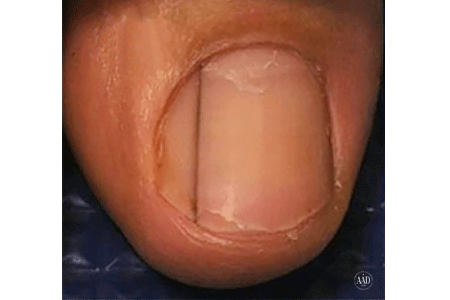
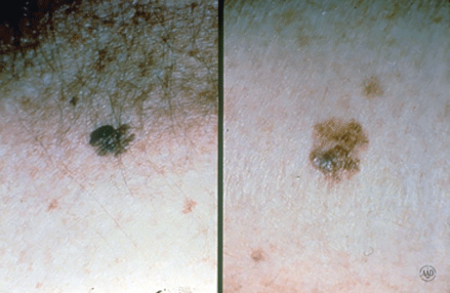
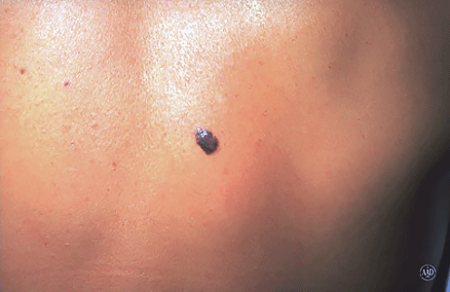
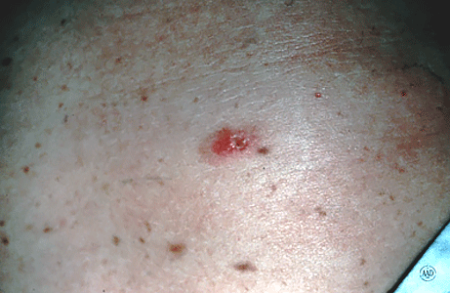
An estimated 2-3% of Americans suffer from excessive sweating of the underarms, or of the palms and soles of the feet. Sweating is embarrassing, it stains clothes, ruins romance and complicates business and social interactions. Severe cases can have serious practical consequences as well, making it hard for people who suffer from it to hold a pen, grip a car steering wheel or shake hands.
If left untreated these problems may continue throughout life. We can help!
Once other medical conditions have been ruled out, we offer a range of exciting treatment options – from prescription products to in-office treatments – to manage this condition. Dr. Robinson has many happy patients who were treated for Hyperhidrosis.
Although neurologic, endocrine, infectious, and other systemic diseases can sometimes cause hyperhidrosis, most cases occur in people who are otherwise healthy. Heat and emotions may trigger hyperhidrosis in some, but many who suffer from hyperhidrosis sweat nearly all their waking hours, regardless of their mood or the weather.
Through a systematic evaluation of causes and triggers of hyperhidrosis, followed by a judicious, stepwise approach to treatment, many people with this annoying disorder can sometimes achieve good results and improved quality of life.
The approach to treating excessive sweating generally proceeds as follows:
Schedule an office visit to discuss your concerns and skincare goals with Dr. Robinson and the office visit cost will be applied to the future cost for the "consulted procedure". The "consulted procedure" must be completed within 30 days of your consult visit.
Vbeam® Perfecta laser is the gold standard to target sun damage, rosacea, and a variety of red broken and damaged blood vessels & other vascular skin conditions, with no downtime. V-Beam helps with Rosacea, stretch marks, Keloid scars, leg veins, spider veins, dilated blood vessels and other conditions.
Additionally, Dr. Robinson can utilize the Vbeam® Perfecta laser to target melanin in pigmented lesions, such as age spots, freckles, and sunspots. The energy from the laser breaks down the excess melanin, allowing the body’s natural healing processes to fade the pigmented lesions over time gradually. It helps rejuvenate healthy skin naturally and restore a softer, smoother skin texture and tone.
The treatment is precise and controlled, minimizing damage to surrounding tissues and reducing the risk of side effects. It also stimulates collagen production, promoting skin rejuvenation and improving overall skin texture and tone.
Vbeam Perfecta is suitable for various skin types and can be used on the face, neck, chest, hands, and other body areas. The procedure is quick, typically lasting between 15 to 30 minutes, and requires minimal downtime, allowing patients to resume their daily activities immediately after treatment.
A Vbeam® laser is a minimally invasive, pulse-dye laser that safely delivers short bursts of light to the treatment area. The light beam targets and coagulates broken and damaged blood vessels and vascular lesions so they may be naturally reabsorbed by your body during the healing process.
After a comprehensive assessment including a skin examination and medical history, Dr. Robinson will design a treatment plan for you. You will be provided with protective eyewear to shield your eyes during the treatment. Using a small hand piece, Dr. Robinson will deliver short bursts of light, lengthening in duration, with puffs of cryogen cooling mist. The treatment is safe and comfortable. Many patients notice improvement after a single treatment, but 3-5 sessions are typically recommended for optimal results. These results can last up to 18 months. Dr. Robinson will recommend a schedule that is right for you.
You should avoid saunas, hot tubs, and other forms of excessive heat for 48 hours after treatment. For the first two weeks avoid skincare products that may clog your pores or cause skin irritation. As with all skin treatments, it is critical to use a SPF 30 or higher sunscreen every time you go outdoors.
Whether used to address specific skin concerns or as part of a comprehensive skincare regimen, Vbeam® Perfecta offers a versatile solution for achieving radiant, youthful-looking skin.
If you’re considering Vbeam® Perfecta laser skin treatment, take the first step towards healthier, more radiant skin by consulting with Dr. Robinson to assess your skin concerns, discuss your treatment goals, and determine if Vbeam® Perfecta is the right option. With our expertise and guidance, you can ensure that you receive personalized care and achieve the best possible results.
Our Cosmetic Consultation Reimbursement policy is offered to all our patients. Come discuss your needs and goals with Dr. Robinson and the office visit cost will be applied to future costs for the discussed procedure. Procedure must be completed within 30 days of your consult visit.
Ultherapy® sets the bar for nonsurgical, regenerative skin medicine in "LIFTING & SKIN TIGHTENING"! Ultherapy® is the only FDA - cleared non-invasive treatment for "lifting & tightening" the skin on the neck, chin and brow. Now it is also the only non-invasive treatment specifically FDA - cleared to improve lines and wrinkles on the décolletage.
WHO SAYS ULTHERAPY® BOOSTS YOUR COLLAGEN?
OH RIGHT, SCIENCE. Ultherapy® is a safe, non-surgical "ultrasound" treatment. As we age, collagen breaks down, resulting in loss of skin strength and elasticity. Through time-tested ultrasound technology, Ultherapy® helps produce new collagen growth with "no downtime" by using the body's own regenerative response to gently and gradually over time "lift" skin above the eyebrow, under the chin and on the neck, and smoothes lines and wrinkles on the décolletage. The result yields firmer younger looking skin, from brow to chest.
Ultherapy® is the only "regenerative" skincare cosmetic procedure to use ultrasound imaging, which is what makes Ultherapy stand out from the others. Ultherapy has the ability to visualize deeper structures of the tissue and allow us to target and treat those areas safely. Also, customizing the treatment for each individual patient. When you're able to use ultrasound visualization, you are able to see where the targeted levels are to ensure the energy is being delivered to the correct depth as you are performing the treatment. It is possible that these tissue planes can shift and change slightly allowing you to add additional pressure to certain areas. Therefore, treating the correct layer depth throughout the entire treatment.
Ultherapy® treats the deep foundational layer addressed in cosmetic surgery, but won't duplicate the results of a facelift. Ultherapy® is a great alternative especially for those not ready for surgery or for patients looking to extend the effects of cosmetic surgery.
Ultherapy® uses sound energy - tried-and-true ultrasound - which has unique properties that allow it to bypass the surface of the skin to treat depths not matched by any other non-invasive cosmetic device. Ultherapy ultrasound stimulates collagen production in the skin's foundation, resulting in a clinically significant lift of tissue over 2-3 months.
Lasers rely on light energy, which cannot reach deeper skin layers at an optimal temperature, so laser treatments typically only treat superficial skin and are not FDA-cleared to lift skin.
Since the two technologies often treat different types of skin issues, they're actually very compatible, like a hand in glove.
Ultherapy® deposits focused ultrasound energy deep beneath the skin at the optimal temperature for collagen regeneration. The treatment jumpstarts a natural process, known as neocollagenesis, to produce fresh, new collagen. Ultherapy® doesn't involve any creams, fillers or toxins; it just relies on your body's own collagen-building process for natural, noticeable results.
The length of the treatment will depend on the area being treated and your individual treatment plan. A face and neck procedure typically takes 60-90 minutes, while a chest treatment takes approximately 30 minutes.
With Ultherapy®, there is no downtime. After your procedure, you can resume your normal activities immediately, without having to follow any special post-treatment measures.
As the ultrasound energy is delivered, you will feel tiny amounts of energy being deposited to precise depths, indicating that the collagen-building process has been initiated. Comfort levels vary from person to person, but the sensation only lasts while the ultrasound energy is being delivered.
After your Ultherapy® Treatment, you may see some initial effect, but the ultimate results will take place over 2-3 months, as your body naturally regenerates collagen. Since the procedure stimulates your own collagen production, how long the results last really depends on you. The treatment produces new collagen on the inside, but your natural aging process will dictate how long that translates into visible results on the outside.
Most patients only need one treatment. However, based on the degree of skin laxity, the biological response to ultrasound energy and the individual's collagen-building process, some patients benefit from additional treatments. Because skin continues to age, future touch-up treatments can help patients keep pace with the body's natural aging process.
The skin might appear flushed at first, but the redness should disappear within a few hours. Some patients experience slight swelling, tingling or tenderness to the touch, but these are temporary in nature. Other, less common post-procedural effects may include temporary bruising or numbness on small areas of skin. As with any medical procedure, there is the possibility for other rare effects, which Dr. Robinson will review with you.
The FDA-cleared Ultherapy® procedure has been used safely in over 250,000 treatments worldwide and has been used safely in the medical field for more than 50 years. In addition, every Ultherapy® practitioner receives extensive procedural training.
The cost of an Ultherapy® treatment can range depending upon the area being treated. To get the most accurate quote, consult with Dr. Robinson.
A good Ultherapy® candidate has mild to moderate skin laxity where the skin begins to feel and look less firm. Examples include a lowered eyebrow line, loose skin on the neck, sagging under the chin, and lines or wrinkles on the chest. The best way to find out if you're an Ultherapy candidate is to consult with Dr. Robinson. Our Cosmetic Consultation Reimbursement policy is offered to all our patients. Come discuss your needs and goals with Dr. Robinson and the office visit cost will be applied to future costs for the discussed procedure. Procedure must be completed within 30 days of your consult visit.
Schedule an office visit to discuss your concerns and skincare goals with Dr. Robinson and the office visit cost will be applied to the future cost for the "consulted procedure". The "consulted procedure" must be completed within 30 days of your consult visit.
Do you ever wish you could try on a treatment before having it done? Now you can with the results simulator tool you will see what your Ultherapy® procedure treatment results could look like. Click here: https://www.ultherapy.com/your-own-ultherapy
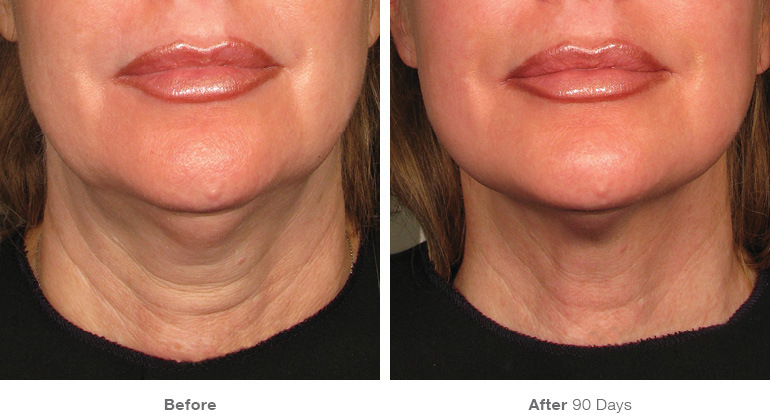
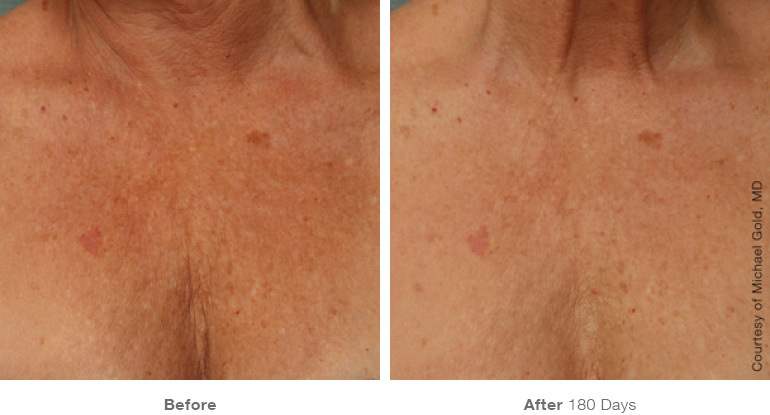
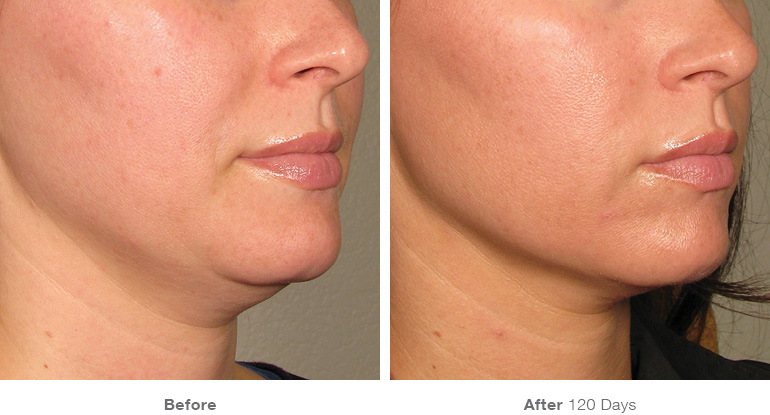
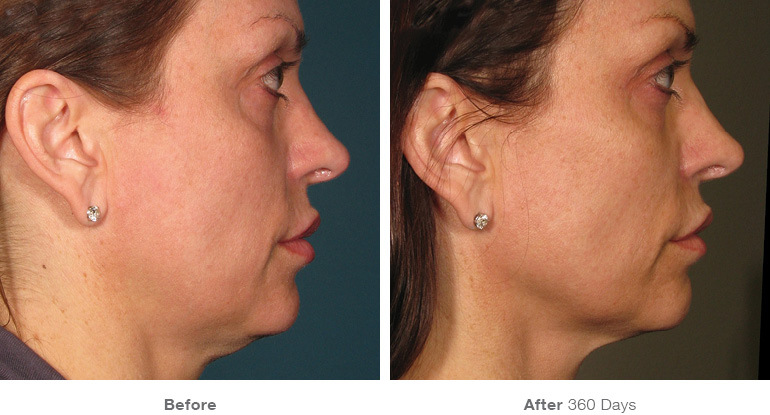
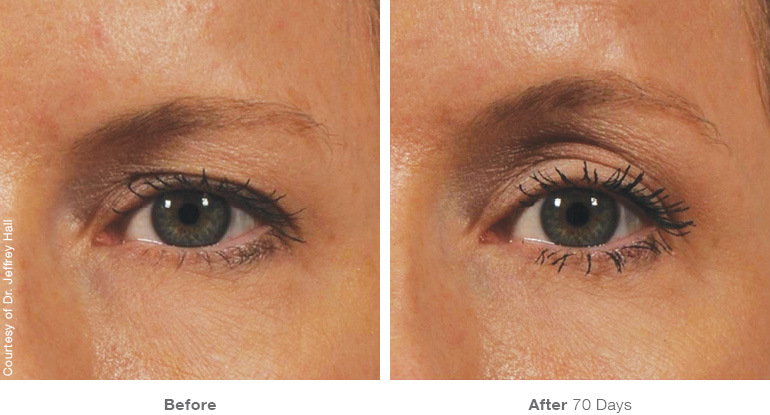
With TempSure Envi, great-looking skin doesn't have to be complicated. TempSure is a radio frequency FULL body skin tightening system designed for both the face and body that minimizes facial fine lines and wrinkles, tightens skin, improving the appearance of cellulite by non-invasively heating up the deep layers of the skin. Applied with a massage wand, this treatment encourages new collagen formation which leaves skin tighter and minimizes wrinkles, fine lines and dimples. It is safe for all skin types and levels of sun exposure, so it fits beautifully and simply into any beauty maintenance routine, any time of year. A series of treatments is recommended. With the TempSure Envi treatment, there’s no surgery, no needles, and no downtime, so you can immediately get back to what you were doing, and look great doing it.
Here's a video about TempSure Envi:
Achieve great looking skin without surgery or downtime.
With TempSure Envi, there is no surgery, no needles, no pain and no downtime. The patient leaves with immediate lift, tightening and healthy "glow".
TempSure Treatment Areas:
TempSure Envi treatment is a gentle way to revive your skin's natural beauty and reduce the appearance of wrinkles and fine lines. The TempSure Envi massage wand delivers radiofrequency technology to gently heat your skin increasing it's temperature for a defined, therapeutic time, triggering your skin's natural response to create new collagen and elastin. At 7-10 days post-treatment, the rebuilding process begins in the skin. Fibroblasts accumulate to synthesize new collagen and elastin and tissue growth factors are released. This process may continue for up to three months giving you tighter, younger-looking skin.
HydraFacial MD - is a great compliment to TempSure Envi
Hydrate before and after your TempSure Envi
Schedule an office visit to discuss your concerns and skincare goals with Dr. Robinson and the office visit cost will be applied to the future cost for the "consulted procedure". The "consulted procedure" must be completed within 30 days of your consult visit.
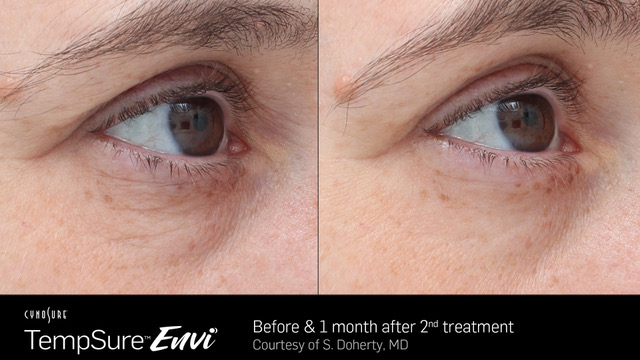
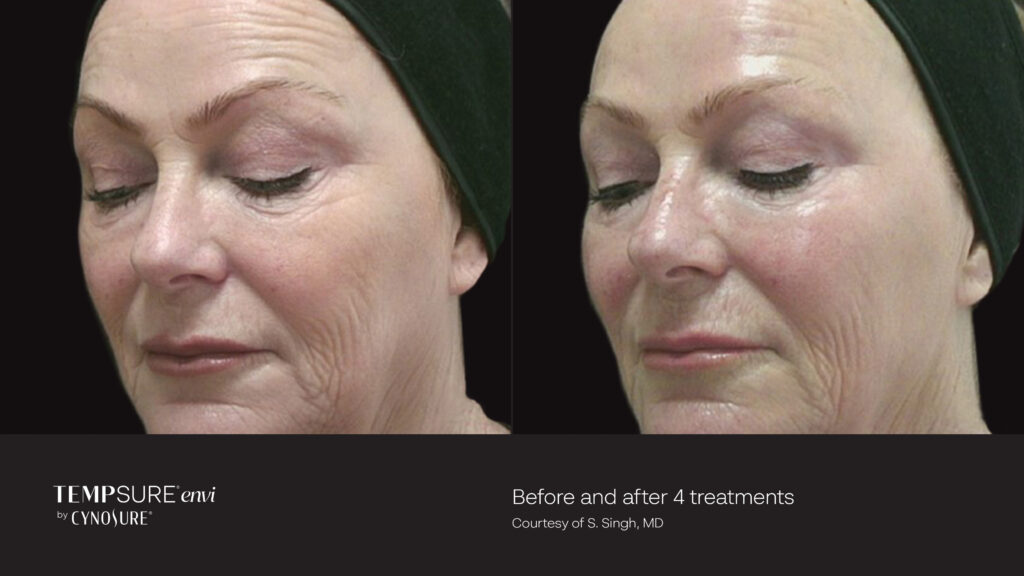
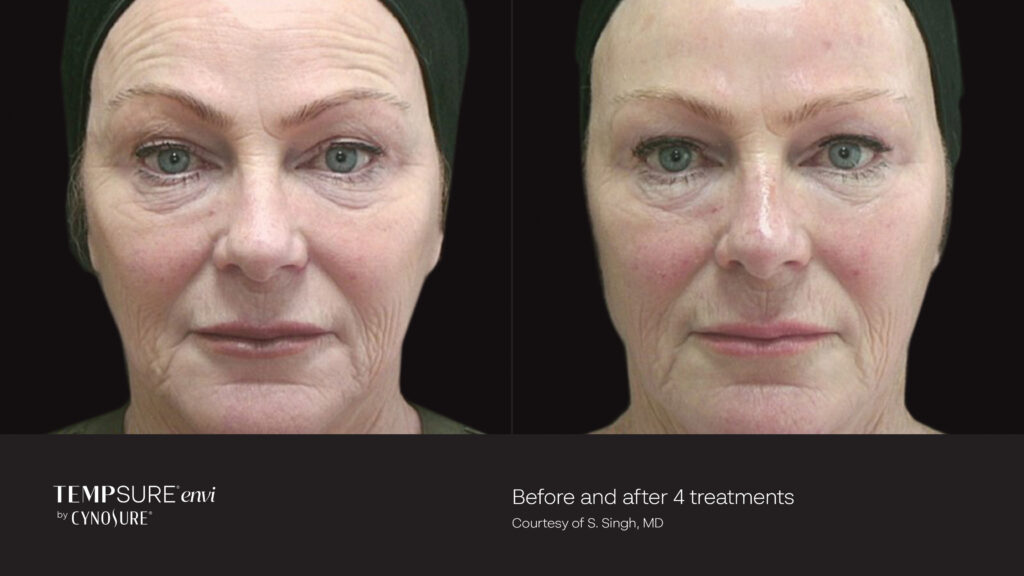
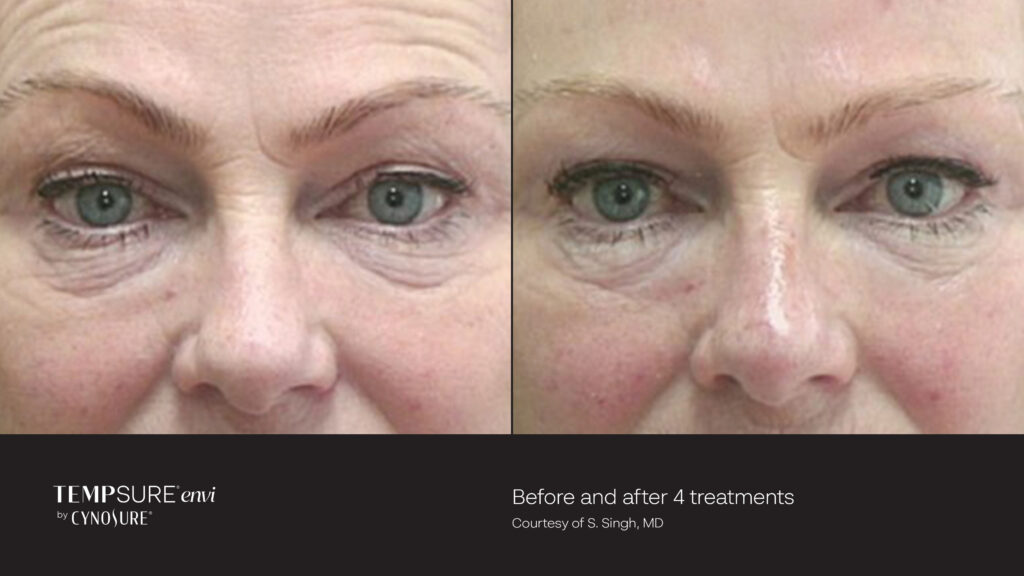
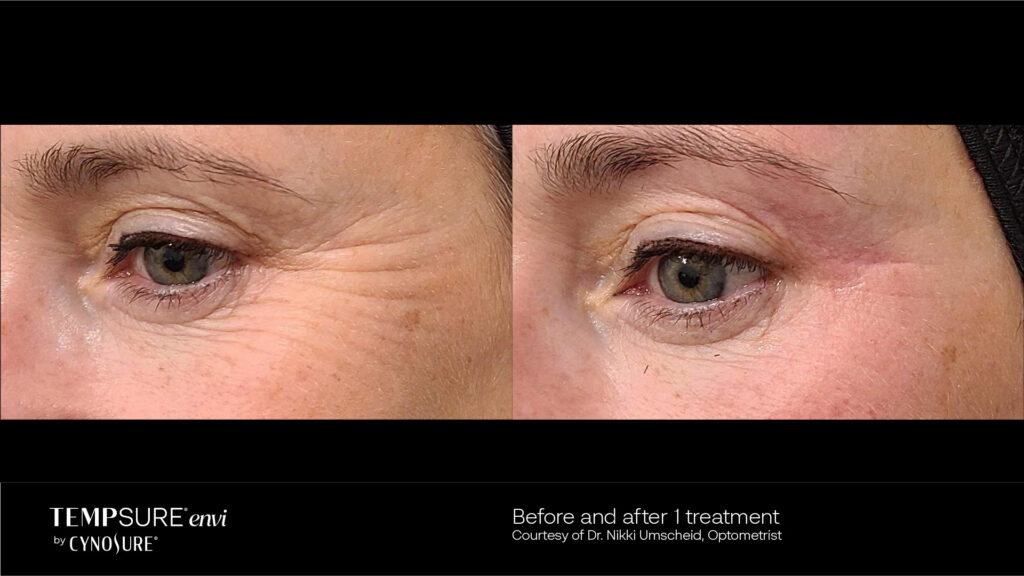
Treatment begins with a warm ultrasound gel applied to the selected skin area. Radiofrequency energy is delivered via a wand which massages and gently heats the skin in relaxing small circular motions. Tissue resistance to RF energy at the dermal and subdermal junction causes an increase in temperature. This temperature is modulated by the TempSure system to safely maintain the skin at appropriate temperature levels. As the skin temperature increases during the procedure, new collagen is created. the new collagen fibers are tight, dense and neatly organized, giving you tighter, younger-looking skin. Once the procedure is complete the skin temperature drops back to normal. TempSure has been designed to provide a comfortable, pain-free and effective treatment every time.
A series of treatments is recommended, therefore, treatments are typically bundled into packages. Every patient is different and the optimum number of treatments can vary. Dr. Robinson and his staff will develop a plan that is right for your goals.
Treatments last about 30-60 minutes, depending on the area(s) being treated. There is no downtime allowing you to return to your normal activities immediately.
TempSure Envi is a simple solution for beautiful skin. It provides a soothing patient experience while delivering beautiful results. Each treatment delivers consistent and controlled heat, giving you an effective, yet comfortable treatment every time.
Instantly - you will leave with an immediate lift, tightening and "natural glow". Patients describe a "tighter, smoother feeling and reduced pore size". The best part is that collagen will continue to rebuild over time, enhancing your skin's appearance.
TempSure Envi is right for those looking to minimize fine lines and lift sagging skin on the face and body. Also, excellent at reducing the appearance of cellulite. Treatments are extremely safe and can be performed on all skin types year round.
Primarily targets pigment and blood vessels. Versatile, state of the art laser commonly used in medical and aesthetic treatments. It is also the best choice for removal of tattoo's, unwanted brown and red spots on your skin including: liver spots, freckles, age spots, sun spots, birthmarks, such as cafe-au-lait spots and Nevus of Ota, broken capillaries, birthmarks, rosacea, tattoos and angiomas. It has been compared to taking a pencil eraser and removing years from the appearance of your skin.
Just about everyone has a few obvious brown spots on their skin. Age spots, freckles, and various birthmarks are just a few of the commonly known marks generally referred to as pigmented lesions. Although some pigmented lesions can be ignored, many are quite conspicuous, and can easily detract from your skin's natural beauty.
Melanin is what gives our skin its color. The amount of melanin in your skin determines if you have a light or dark complexion. Pigmented lesions are dark in color simply because the melanin is abnormally concentrated in one area of the skin. High concentrations of melanin can be due to various factors. Some types are present at birth, but most occur with age, or as a result of overexposure to the sun's damaging ultraviolet rays.
The MedLite laser is one of the most technologically advanced lasers for removing pigmented lesions. The laser removes these pigments with the energy of light. The specialized light produced by the MedLite laser is absorbed by the pigmented lesion. The unwanted pigment is then destroyed, thus removing or lightening the lesion.
The MedLite Laser is most commonly used for removing brown and red spots, age spots, liver spots, sun spots, freckles, birthmarks, such as cafe-au-lait spots and Nevus of Ota, broken capillaries, tattoos and angiomas.
No, the laser light of the MedLite laser was specifically designed to effectively target the dark concentrations of melanin. After the abnormal amounts of melanin are removed, the skin's natural regenerative system will replace the normal melanin over time, returning the skin to its natural color.
The MedLite laser emits light in very short pulses. The impact of the energy from the power pulse of light is similar to the snap of a thin rubber band. After the treatment, the area will feel similar to a light sunburn. Typically any discomfort will disappear within a day or so. After the redness clears, the skin returns to its natural color, texture and tone.
Most common pigmented lesions are removed within one to two treatments. Some deeper lesions will require more treatments.
Common pigmented lesions do not return. Some birthmarks may return after a period of several months to a year. If that should occur, the procedure can be repeated.
Usually, an antibacterial ointment will be applied to the area immediately after treatment. The treated area should be kept clean with a continued application of any ointment recommend to you by Dr. Robinson. The treated area should not be scrubbed.
Make an appointment for a consultation to discuss your specific needs.
Decorative tattoos have a history dating back at least 5000 years and the desire to remove them has probably existed for just as long. Early attempts to remove tattoos have had less than desirable results. The use of dermabrasion, saltabrasion and Argon or CO2 lasers have left behind scars in place of the tattoo. The advent of Q-Switched lasers has permitted the removal of most tattoo inks with a very low risk of scarring. The MedLite laser; Q-Switched Nd: YAG laser is the laser of choice for tattoo removal. The MedLite laser can significantly lighten or remove a wide variety of tattoo inks.
The MedLite laser removes tattoo ink with the energy of light. A laser is a device which is designed to produce one or more specific wavelengths of light. Tattoo ink is removed by using this specific wavelength of light which passes into the skin, but is absorbed by the ink. The rapid absorption of light energy causes the tattoo ink to break into tiny particles which can then be removed by the body's own natural filtering systems. The MedLite laser provides maximum tattoo removal while leaving the surrounding skin unharmed.
The MedLite laser can remove professional, amateur (homemade), traumatic and surgical tattoos.
On the average, professional tattoos require 6-8 treatments, while amateur tattoos require 4-5 treatments, all spaced approximately 6-8 weeks apart. The number of treatments depends on the amount and type of ink used, and the depth of the ink in the skin.
Dark (blue, black) and red inks will resolve the best. Oranges and purples usually fade as well. Green and yellow inks are the most difficult to remove, and additional treatments are needed to produce significant fading.
In over 95% of the cases fading of the tattoo will be accomplished. However, there are many types of tattoo inks in use today which are not regulated by the FDA. Not knowing which tattoo ink was originally used, or how deeply it was applied, makes it impossible for the physician to predict the degree of removal on any given tattoo.
The MedLite laser emits light in very short pulses. The impact of the energy from the pulse of light is similar to the snap of a small rubber band on the skin. The majority of patients do not require anesthesia, depending on the size and location of the tattoo. Anesthesia creams are available if needed.
An antibacterial ointment and a dressing will be applied to the area immediately after treatment. Occasionally, there will be pinpoint bleeding associated with the treatment. The treated area should be kept clean. Follow office post laser treatment instructions for what to do during the days following the procedure. A shower can be taken the next day, although the treated area should never be scrubbed. If a scab forms it is vital that you do not pick it or scratch it.
Dr. Robinson will be happy to discuss this procedure with you. Please feel free to make an appointment for a consultation to discuss your specific needs.
Cosmetic Consultation Reimbursement policy offered to all patients. Come discuss your needs and goals with Dr. Robinson and the office visit cost will be applied to future costs for the discussed procedure. Procedure must be completed within 30 days of your consult visit.
